捷进英语综合教程1Unit2
综合教程1 Unit 2 Friendship 小楠笔记
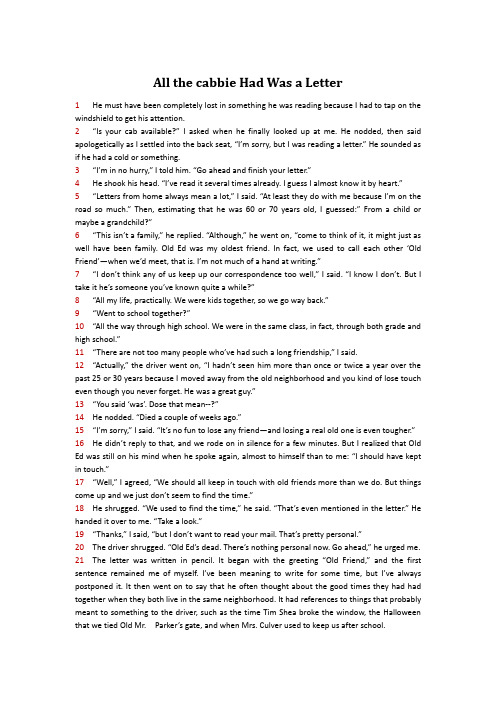
All the cabbie Had Was a Letter1He must have been completely lost in something he was reading because I had to tap on the windshield to get his attention.2“Is your cab available?” I asked when he finally looked up at me. He nodded, then said apologetically as I settled into the back seat, “I’m sorry, but I was reading a letter.” He sounded as if he had a cold or something.3“I’m in no hurry,” I told him. “Go ahead and finish your letter.”4He shook his head. “I’ve read it several times already. I guess I almost know it by heart.”5“Letters from home always mean a lot,” I said. “At least they do with me because I’m on the road so much.”Then, estimating that he was 60 or 70 years old, I guessed:”From a child or maybe a grandchild?”6“This isn’t a family,” he replied. “Although,” he went on, “come to think of it, it might just as well have been family. Old Ed was my oldest friend. In fact, we used to call each other ‘Old Friend’—when we’d meet, that is. I’m not much of a hand at writing.”7“I don’t think any of us keep up our correspondence too well,” I said. “I know I don’t. But I take it he’s someone you’ve known quite a while?”8“All my life, practically. We were kids together, so we go way back.”9“Went to school together?”10“All the way through high school. We were in the same class, in fact, through both grade and high school.”11“There are not too many people who’ve had such a long friendship,” I said.12“Actually,” the driver went on, “I hadn’t seen him more than once or twice a year over the past 25 or 30 years because I moved away from the old neighborhood and you kind of lose touch even though you never forget. He was a great guy.”13“You said ‘was’. Dose that mean--?”14He nodded. “Died a couple of weeks ago.”15“I’m sorry,” I said. “It’s no fun to lose any friend—and losing a real old one is even tougher.”16He didn’t reply to that, and we rode on in silence for a few minutes. But I realized that Old Ed was still on his mind when he spoke again, almost to himself than to me: “I should have kept in touch.”17“Well,” I agreed, “We should all keep in touch with old friends more than we do. But things come up and we just don’t seem to find the time.”18He shrugged. “We used to find the time,” he said. “That’s even mentioned in the letter.” He handed it over to me. “Take a look.”19“Thanks,” I said, “but I don’t want to read your mail. That’s pretty personal.”20The driver shrugged. “Old Ed’s dead. There’s nothing personal now. Go ahead,” he urged me. 21The letter was written in pencil. It began with the greeting “Old Friend,”and the first sentence remained me of myself. I’ve been meaning to write for some time, but I’ve always postponed it. It then went on to say that he often thought about the good times they had had together when they both live in the same neighborhood. It had references to things that probably meant to something to the driver, such as the time Tim Shea broke the window, the Halloween that we tied Old Mr. Parker’s gate, and when Mrs. Culver used to keep us after school.22“You must have spent a lot of time together,” I said to him.23“Like it says there,” he answered, “about all we have to spend in those days was time.” He shook his head: “Time.”24I thought the next paragraph of the letter was a little sad: I began the letter with “Old Friend”because that we’ve become over the years—old friends. And there aren’t many of us left.25“You know,”I said to him, “when it says here that there aren’t many of us left, that’s absolutely right. Every time I go to a class reunion, for example, there are fewer and fewer still around.”26“Time goes by,” the driver said.27“Did you two work at the same place?” I asked him.28“No, but we hung out on the same corner when we were single. And then, when we were married, we used to go to each other’s house every now and then. But for the last 20 or 30 years it’s been mostly just Christmas cards. Of course there’d be always be a note we’d each add to the cards—usually some news about our families, you know, what the kid was doing, who moved where, a new grandchild, things like that—but never a real letter or anything like that.”29“This is a good part here,” I said. “Where it says your friendship over the years has meant an awful lot to me, more than I can say because I’m not good at saying things like that.”I found myself nodding in agreement. “That must have made you feel good, didn’t it?”30The driver said something that I couldn’t understand because he seemed to be all choked up, so I continued: “I known I’d like to receive a letter like that from my oldest friend.”31We were getting close to our destination so I skipped to the last paragraph. So I thought you’d like to know that I was thinking of you. And it was signed, Your Old Friend, Tom.32I handed back the letter as we stopped at my hotel. “Enjoyed talking with you,” I said as I took my suitcase out of the cab. Tom? The letter was signed Tom?33“I thought your friend’s name was Ed,” I said. “Why did he sign it Tom?”34“The letter was not from Ed to me,”he explained. “I’m Tom. It’s a letter I wrote to him before I knew he’d died. So I never mailed it.”35He looked sort of sorrowful, or as if he were trying to see something in the distance. “I guessI should have writer it sooner.”36 When I got to my hotel room I didn’t unpack right away. First I had write a letter—and mail it.。
英语综合教程1参考答案
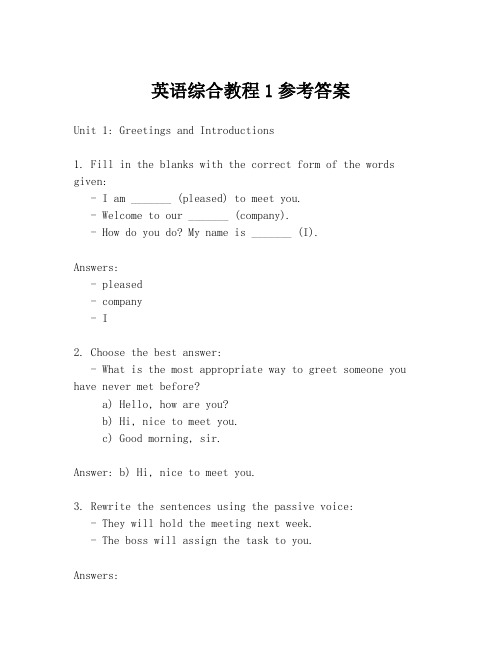
英语综合教程1参考答案Unit 1: Greetings and Introductions1. Fill in the blanks with the correct form of the words given:- I am _______ (pleased) to meet you.- Welcome to our _______ (company).- How do you do? My name is _______ (I).Answers:- pleased- company- I2. Choose the best answer:- What is the most appropriate way to greet someone you have never met before?a) Hello, how are you?b) Hi, nice to meet you.c) Good morning, sir.Answer: b) Hi, nice to meet you.3. Rewrite the sentences using the passive voice:- They will hold the meeting next week.- The boss will assign the task to you.Answers:- The meeting will be held next week.- The task will be assigned to you by the boss.Unit 2: Daily Conversations1. Fill in the blanks with the correct prepositions: - I usually go to the gym _______ the morning.- She is interested _______ music and art.Answers:- in- in2. Complete the dialogue with the appropriate phrases: - A: What time is it now?B: It's _______.- A: Do you have any plans for the weekend?B: Yes, I _______ to the movies.Answers:- A: What time is it now?B: It's half past three.- A: Do you have any plans for the weekend?B: Yes, I am going to the movies.3. Translate the following sentences into English:- 你今天过得怎么样?- 我需要一些时间来适应新工作。
(捷进英语1)Unit1-电子教案

(阅读)
Reading for doing
Students read posters describing activities and clubs around campus.
Students create their own club.
This section should take less time than the text in Reading for learning as the text is shorter. However, there is some challenging vocabulary in some of the posters. They focus on developing students everyday reading skills and it leads into a mini productive writing task.
Before completing Task 2 you could elicit the punctuation rules students have already known.
With weaker students you might want work through an example in Task 3.
捷进英语 Unit 2

捷进英语Unit 2老猴子咬菜根学习交流Unit 2 Lesson 1 Baby talk. 儿语Hi Sherise. 嗨,Sherise。
Hello Sherise. 你好,Sherise。
Where's Sherise? Sherise去哪儿了?Has Sherise gone to the movies? Sherise去看电影了吗?No,she hasn't. 不,没有。
She's right here! Wuh-wuh-wuh... 她就在这儿!Excuse me? 对不起。
Oh! Good morning. 噢!早上好。
Good morning, Wendy. 早上好,Wendy。
Friend of yours? 你的朋友?That's Sherise. 她是Sherise。
Where's Sherise? Sherise在哪儿?Sherise is in the restaurant. Sherise在餐厅。
The question is, who is Sherise? 问题是,Sherise是谁?Nina's baby. Nina的小孩。
Oh. 噢。
And where is Nina? 那么Nina在哪儿?She's at a meeting. 她在开会。
And where's the meeting? 在哪儿开会?At the Children's Center. 在儿童中心。
Nina's gone to a meeting at the Children's Center, and her baby is here?Nina去儿童中心开会了,而她的孩子在这儿?That's right. 对。
Has Sherise gone to the meeting? Sherise去开会了吗?No,she hasn't.没有。
英语综合教程1
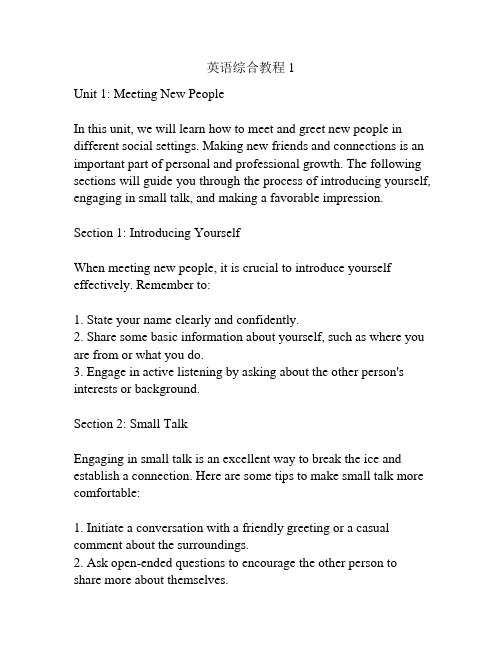
英语综合教程1Unit 1: Meeting New PeopleIn this unit, we will learn how to meet and greet new people in different social settings. Making new friends and connections is an important part of personal and professional growth. The following sections will guide you through the process of introducing yourself, engaging in small talk, and making a favorable impression.Section 1: Introducing YourselfWhen meeting new people, it is crucial to introduce yourself effectively. Remember to:1. State your name clearly and confidently.2. Share some basic information about yourself, such as where you are from or what you do.3. Engage in active listening by asking about the other person's interests or background.Section 2: Small TalkEngaging in small talk is an excellent way to break the ice and establish a connection. Here are some tips to make small talk more comfortable:1. Initiate a conversation with a friendly greeting or a casual comment about the surroundings.2. Ask open-ended questions to encourage the other person to share more about themselves.3. Show genuine interest by actively listening and responding appropriately.Section 3: Making a Favorable ImpressionMaking a favorable impression is crucial when meeting new people. Here are some strategies to consider:1. Maintain eye contact and have an open and friendly body language.2. Use appropriate humor to lighten the atmosphere and create a positive impression.3. Be a good listener and show empathy towards others.Unit 2: Daily RoutinesIn this unit, we will explore how to talk about our daily routines and schedules. Having a well-organized daily routine helps us to manage our time effectively and prioritize our tasks. Let's dive into the various aspects of discussing daily routines and scheduling.Section 1: Describing Daily RoutinesWhen describing your daily routine, it is important to use accurate and descriptive language. Some points to remember include:1. Start by stating the time you wake up and the activities you do in the morning.2. Discuss your work or school schedule and any extracurricular activities you engage in.3. Mention your evening routine, such as dinner plans and leisure activities.Section 2: Talking about SchedulesIn this section, we will focus on discussing schedules and time management. Consider the following tips:1. Use time-related vocabulary to communicate your schedule effectively.2. Talk about your daily or weekly commitments and how you plan your time.3. Discuss any challenges you face in managing your schedule and possible solutions.Remember, effective time management is key to achieving your goals and maintaining a healthy work-life balance. Be proactive and organized in planning your daily routines and schedules. (Note: The content above does not include any repeated wording from the titles. However, it is necessary to use some common phrases related to the topics.)。
综合教程1第二单元课后练习答案解析
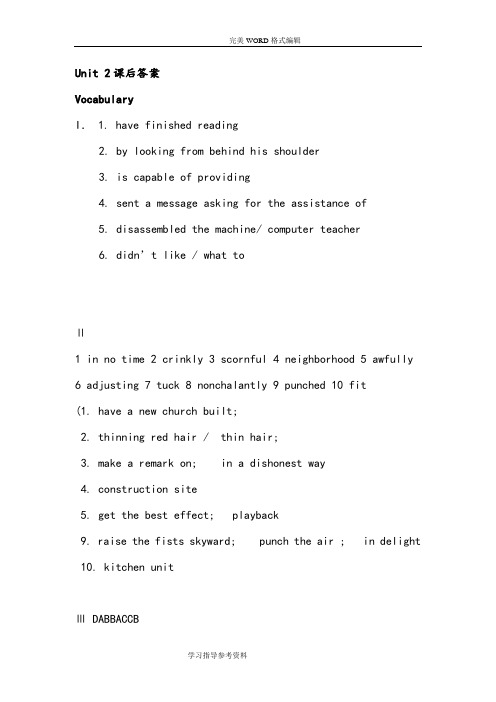
Unit 2课后答案VocabularyI. 1. have finished reading2. by looking from behind his shoulder3. is capable of providing4. sent a message asking for the assistance of5. disassembled the machine/ computer teacher6. didn’t like / what toⅡ1 in no time2 crinkly3 scornful4 neighborhood5 awfully6 adjusting7 tuck8 nonchalantly9 punched 10 fit(1. have a new church built;2. thinning red hair / thin hair;3. make a remark on; in a dishonest way4. construction site5. get the best effect; playback9. raise the fists skyward; punch the air ; in delight10. kitchen unitⅢ DABBACCB(4. code of conduct6. by a score of 1-28. a way out of this trouble)Ⅳ1 funny, interesting, interesting, funny(funny is a very formal word, focusing mainly on whatever results in laughter because of oddness, abnormality, or inappropriateness. Interesting refers to something that attracts people’s attention, usually and deserves their observation and study.)2 silent, silent, still, still(Still suggests a tranquil state, and often refers to a moment of calm between periods of noise and movement, and during this moment there is no sign of activity. Silent simply means “becoming speechless or being without noise”; it does not necessarily suggest serenity or motionlessness.)3 dispute, arguing, disputing, arguing(Dispute is often used as a transitive verb及物动词, meaning “say that something is incorrect or untrue; fight passionately for 激烈争夺control or ownership of something.”Argue usually refers to a reasoned presentation of views or to a heated exchange of opinion; very often, when usedintransitively不及物动词时, it is followed by prepositions 介词 like “with”, “for/ against”, “about” , etc.)4 usual, usual, Regular, regular(usual is applied to whatever recurs frequentlyⅤ1. Today Tommy found a real book.Synonyms: actual, genuine, true2. They turned the pages, which were yellow and crinkly, and it was awfully funny to read words that stood still instead of moving the way they were supposed to —on a screen, you know.Antonyms: moving, movable, mobile, restless,3. They turned the pages, which were yellow and crinkly, and it was awfully funny to read words that stood still instead of moving the way they were supposed to —on a screen, you know.Synonyms: rough, coarse, uneven4. Margie always hated school, but now she hated it more than ever.Antonyms: like, love, enjoy5. Margie was scornful.Synonyms: disdainful, contemptuous6. Tommy looked at her with very superior eyes.Antonyms: inferior, subordinate, secondary7. “Maybe,” he said nonchalantly.Synonyms: indifferently, coldly, coolly, casually, offhandedly8. Little girls learned better if they learned at regular hours.Antonyms: irregular, uncertain, randomⅥ1 pointless,2 reproductiom,3 unreliable,4 generosity,5 apologetic,6 disobedience,7 emplyer, emplyees,8 encouragementGrammar1 the, the2 a3 a, a , /4 a5 the6 /,the7 The, the , /8 the, the9 a, a , a10 a, a ,aⅡ1 ///2 /3 the, /4 the, /5 //6 The7 the8 the, the 9 the, / 10 /Ⅲ1 Light2 a noise3 very good weather4 bad luck5 president6 The vegetables7 war8 All the books9 coffee 10 poetryⅣ 1 / 2 the 3 / 4 the 5 the 6/ 7 / 8 theⅤ 1 A Briton falls to his death on the Matterhorn.2 An Olympic silver medalist dies in a crash.3 Callaghan recalls the British Ambassador from Chile.4 The army ends the chaos in the capital.5 A college student wins the first prize.Translation1..Yesterday a government delegation headed by the Minister of Foreign Affairs arrived in South Africa and began a three-day friendly visit to the country.2 It is awfully funny to look at these caricatures which satirize social ills.3 Computers are one of the most useful teaching aids, for all your lessons as well as all the questions asked and all the answers provided can be shown on a screen.4 Xiao Zhang’s mother fell ill the day before yesterday; he sent for a doctor immediately.5 He failed in the college entrance examination last year, but he did not feel disappointed. Instead, he continued to study hard, passed the examination successfully and became a student in a famous university this year.6 There are many English words that this middle school student cannot pronounce correctly.7 In this era of information explosion, we have to make constant efforts to renew our knowledge. Only thus can we become adjusted to the requirements of our work.8 With his shirt tucked into the top of his trousers and a leather bag tucked under his arm, the boy looked just like a boss.9 Although she is only eight years old, the little girl is already very good at calculating fractions. No wonder her parents feel proud of her.10 All the neighborhood have heard of the news, but you haven’t. Don’t you think it is strange?写作老师上课讲IV. Exercises for integrated skills1. DictationChildren learn almost nothing from television, / and the more they watch, / the less they remember. / They regard television purely as entertainment, / resent programs that make demands on them / and are surprised that anybody should take the medium seriously. / Far from being over-excited by programs, / they are mildly bored with the whole thing. / These are the main conclusions from a new study of children and television. / Its author confirms / that the modern child is a dedicated viewer. / The study suggests / that there is little point in the television company’s attempts / to isolate adult viewing in the later hours./ More than a third of the children regularly watched their programs after 9 p.m./ All 11-year-olds had watched programs after midnight.2. Fill in each blank in the passage below with ONE word you thinkappropriate.What (1) fun it is to jump into a pool or go swimming in a river in summer! Howjoyful and relaxing it is to have a (2) game of table tennis after a day of study at school! And how exciting it is to play or (3) watch a close game of basketball or volleyball! All over the world (4) millions of people take part in different kinds of sports. Sports are perhaps the most (5) popular form of relaxation that almost all can enjoy, no matter (6) who they are, boys or girls, men or women, young or old.Some people seem to think that sports and games are unimportant things that people do (7) at times when they are not working, instead of going to the cinema, listening to the (8) radio, or sleeping. But in fact sports and games can be of great (9) value, especially to people who work with their brains. They should not be treated only as (10) amusement.VII. Listening ExercisesFrom Television Back to GamesYou are going to hear a small talk in which the speaker compares television with board games.A.Listen carefully. Supply the missing words. For each blank you needof money onor spendingThey offer usInstead ofThey are, andmuch pretendpeople.B. Listen again and complete the following chart, which shows theTapescriptFrom Television Back to GamesIn a society where nobody is so fortunate as to be able to spend a lot of money on entertainment, most of us end up with either in front of a television or spending time with our family and friends playing a game of some kind. While television is probably the most popular form of home entertainment, there is a small group of us who still believe board games offer the most enjoyment. They offer us a variety of ways to learn new information, to test our skills, and most importantly, to bring us together.Television is one of our best sources of information, but a lot of times it is not the kind of information that you want or need. The commercials for instance always insult your intelligence. On the other hand, board games are set up to offer a variety of information, which can cover subjects such as geography, vocabulary, or financial investment. All of this information is offered in a way that makes you want to learn and lets you choose what you learn. I have acquired more information about history, geography, and science from “Trivial Pursuit” alone than I have ever been able to get from the boring way they are presented on television.Added to the benefits of learning new information, board games test your skills and knowledge with a particular outcome ahead. They let you use your ideas and strategies to win the game. Whether you are trying to get your opponent’s king inchess or trying to ma ke the most money in “Trump,” there is an outcome which you brought about with these ideas and strategies. However, you are forced to become a passive spectator when watching television. In some cases a program might be produced to stimulate your thought processes, but it doesn't offer you an outlet for following through with your ideas, such as the useless concept of the game show for entertainment.Still the most important difference between television and the board game is the interaction with others. Getting the family together to watch a show on television is nice; that is, if you can find a show on for the whole family. But playing a board game gives you the chance to learn, not only about the subject, but also about each other. Everyone is different, with their own views and unique ways of handling situations, giving each game a different outcome. One of the nicest parties I ever attended was one where we played a murder-mystery game called “How to Host a Murder.” We never knew what to expect next, and it was a wonderful way to get to know everyoneInstead of watching television all the time, people are finding that board games give us the outlet to test our skills and knowledge against each other. They are putting their remote controls away and giving up their “Executive Couch Potato” status, and gathering around the kitchen table for an exciting game. I would much rather pretend that I’m a millionaire, playing for the high stakes, rather than watch someone else on a glass tube pretending to be one. It’s more exciting, less expensive, and best of all, I spend the time with real and interesting people.。
《综合教程》(第2版)第一册Unit 2 The Fun They Hadppt课件
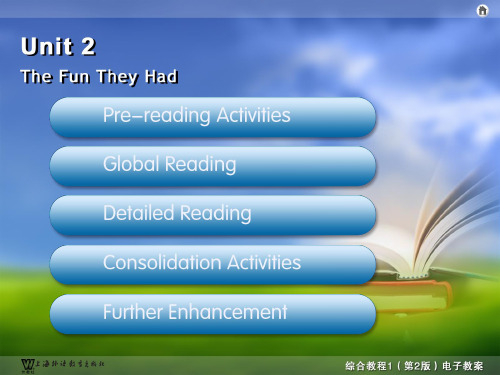
Reading aloud Cultural information Audiovisual supplement
Audiovisual supplement
Watch a video clip and answer the following questions. 1. What’s your most impressive help that human
Reading aloud Cultural informaபைடு நூலகம்ion Audiovisual supplement
These may include:1. A setting in the future, in alternative timelines, or in an historical past that contradicts known facts of history or the archaeological record; 2. A setting in outer space, on other worlds, or involving aliens; 3. Stories that involve technology or scientific principles that contradict known laws of nature; 4. Stories that involve discovery or application of new scientific principles, such as time travel or psionics, or new technology, such as nanotechnology, faster-than-light travel or robots, or of new and different political or social systems (e.g. a dystopia, or a situation where organized society has collapsed)
大学英语综合教程1Unit2习题答案
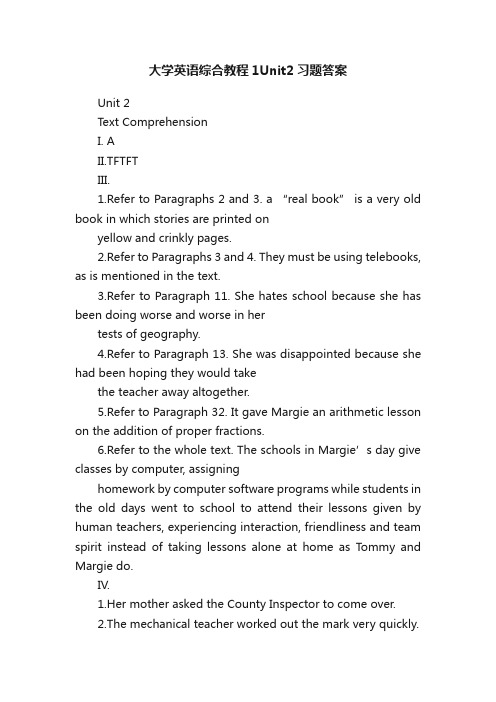
大学英语综合教程1Unit2习题答案Unit 2Text ComprehensionI. AII.TFTFTIII.1.Refer to Paragraphs 2 and 3. a “real book” is a very old book in which stories are printed onyellow and crinkly pages.2.Refer to Paragraphs 3 and 4. They must be using telebooks, as is mentioned in the text.3.Refer to Paragraph 11. She hates school because she has been doing worse and worse in hertests of geography.4.Refer to Paragraph 13. She was disappointed because she had been hoping they would takethe teacher away altogether.5.Refer to Paragraph 32. It gave Margie an arithmetic lesson on the addition of proper fractions.6.Refer to the whole text. The schools in Margie’s day give classes by computer, assigninghomework by computer software programs while students in the old days went to school to attend their lessons given by human teachers, experiencing interaction, friendliness and team spirit instead of taking lessons alone at home as Tommy and Margie do.IV.1.Her mother asked the County Inspector to come over.2.The mechanical teacher worked out the mark very quickly.3.Tommy looked at Margie with an air which suggested he knew far better about school thanothers.4. A teacher has to make necessary changes about what to teacher and how to teacher so as tomeet the different needs of different pupils.V ocabularyI1. have finished reading2. by looking from behind his shoulder3. is capable of providing4. sent a message asking for the assistance of5. disassembled the machine/computer teacher6. didn’t like/want toII1. in no time2. crinkly3. scornful4. neighborhood5. awfully6. adjusting7. tuck8. nonchalantly 9, punched 10. fitIII\DABBACCBIV1.funny, interesting, interesting, funny2.silent, silent, still, still3.dispute, arguing, disputing, arguing/doc/7416161820.html,ual, usual, regular,regularV.1. actual, genuine, true2. moving, movable, mobile, restless3. rough, coarse, uneven4, like, love, enjoy5. disdainful, contemptuous6. inferior, subordinate, secondary7. indifferently, coldly, coolly, casually, offhandedly8. irregular, uncertain, randomVI.1. pointless2. reproduction,3. unreliable4. generosity5. apologetic6. disobedience7. employer, employees8. encouragementGrammarI1. the, the2. a3. a, a , /,4. a5. the6. /, the 7, The, the, /8. the, the 9. a, a, a 10. a, aII1. /,/,/2. /3. the, /4. the, /5. /,/6. The7. the8. the, the9. the, / 10, /III1.light, 2 a noise, 3. very good weather, 4. bad luck, 5. president, 6. The vegetables, 7. war,8, all the books, 9. coffee, 10. poetryIV1. /2. the3. /4. the5. the6. /7. /8. theV1. A Briton falls to his death on the Matterhorn.2.An Olympic silver medalist dies in a crash.3.Callaghan recalls the British Ambassador form Chile.4.The army ends the chaos in the capital.5. A college student wins the first prize.VIIt is pretty difficult for you to live in a foreign country if you do not speak and understand the local language.TranslationI.1. 玛吉的爷爷曾经说过,小时候他的爷爷告诉他,过去故事都是印刷爱纸上的。
